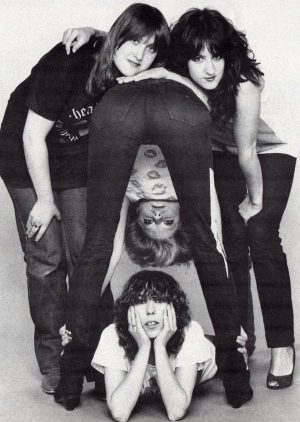
Forming in 1975 as Painted Lady, GIRLSCHOOL have been together for 40 years and are showing no signs of slowing down. With nothing to lose, KIM MCAULIFFE and ENID WILLIAMS are back in the studio and back to school. KEVIN STEWART-PANKO is asked to see teacher after class
There’s a girl, her name’s Louise and she runs things around here. On any old, average day, she’s charming, delightful and lights up the room with her smile. But today, the ribbons in her hair are fluttering more than usual, her grin is wider than wide and the rainbows she usually shits are blindingly bright. All that because we’ve managed to get the almighty Girl-Fucking-School in Iron Fist and if the emails throughout our exchange on the matter are any indication, to say she’s honoured, happy and tickled to have one of her all-time faves in these pages is like saying Lemmy’s gone a few rounds with a bottle of whiskey.
Guitarist/vocalist Kim McAuliffe and bassist/vocalist Dinah ‘Enid’ Williams originally came together in 1975 under the moniker Painted Lady after growing up alongside one another on the mean streets of Wandsworth while staring down the inhospitable climate that greeted the idea of the “fairer sex” picking up instruments for any other reason than moving them in order to clear a path to the kitchen. Exhibiting unwavering resolve, the longest running all-female metal band in the history of forever have experienced all the dizzying highs of success, tragedies (lead guitarist/vocalist Kelly Johnston succumbed to spinal cancer in 2007), the usual line up changes and crushing lows of label and fan indifference at various points in their 40 years as an institution. In response to the resurgence in interest ignited by metal’s retro-obsessed old guard and newer fans who’ve discovered the band on the internet, the quartet of McAuliffe, Williams, drummer Denise Dufort and lead guitarist Jackie Chambers have been re-energised. When Iron Fist caught up with Williams and McAuliffe, the band was in the process of putting the finishing touches on their twelfth album, ‘Guilty As Sin’. Join us as we scratch the surface on 40 years of rock ‘n’ roll, and absolutely and totally make Miss Brown’s fucking day.
Much to the chagrin of probably everyone reading this, let’s start with a discussion of the new stuff? Given the renewed interest in the older material, which you acknowledged by re-recording ‘Hit And Run’ in 2011, at what point did you start working on new stuff?
Enid: “It’s not quite as simple as that. The fact is that things have changed radically in the last few years in music, and they continue to do so. One of the changes is that, of course, people don’t sell the same volume of records that they used to and everyone goes online. So, when a band like us does a gig, half the audience these days are the guys in their 40s who remember us from the first time ‘round and the other half are 18-21 year olds who discovered us online. But no matter who they are, people want to hear the old material and I think that’s true for every band, and for us that tends to be the ‘Demolition’ and ‘Hit And Run’ time period.
“On the one hand, we love doing new material, some of us in the band moreso than others. It’s exciting, it’s fun and I love recording, but somebody has to put up some money for us to go into the studio and we’ve got to get that back. A lot of bands used to do an album a year and that was fairly normal. I don’t think that happens much anymore. I’d be happy to do an album of new material every year, that would be brilliant, but we’d only ever end up playing a couple songs from the new records.”
Kim: “Well, doing new material wasn’t my choice. We had the album ‘Legacy’ [2008], which I thought was going to be our last studio album. It had all those guests on it – Dio, Tony Iommi, Twisted Sister, Motörhead – and I thought that it was the greatest studio album we’d done since ‘Hit And Run,’ really. The record company wanted more and then came the idea of re-recording ‘Hit And Run’, which was also a way of reclaiming our songs from the people who still owned the bloody things that we don’t get anything from, plus it was celebrating the album’s 30th anniversary. So, we agreed to do that and we really enjoyed it. I thought, ‘That’s got to be it; nobody’s going to be interested.’ But they both became small successes record sales-wise and they wouldn’t have had us do another one unless it was worthwhile. So, here we go again and it’s quite exciting!”
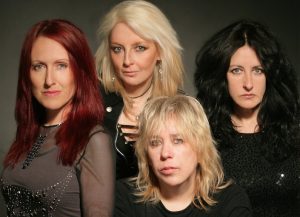 With that in mind, did you find it challenging getting into the mode of writing new material?
With that in mind, did you find it challenging getting into the mode of writing new material?
Enid: “Yeah, [new material] keeps things exciting and interesting. I mean, I do enjoy playing the old stuff, as long as it’s not too much. One of the things we do in Girlschool is limit the gigs that we do. We don’t go out and do long tours. By doing short tours and the odd festival, when we do get up and play a song we’ve done for 30 years, it’s still fresh and exciting, which it wouldn’t be if we’d done it ten nights in a row. When it comes to the new material, the first time you play a song on stage, it’s quite nerve-wracking and it’s good to be able to still feel that fear and excitement. There are three writers in the band, essentially. Jackie and myself, particularly, love to write and I’m sure we could probably do entire albums individually. So, there’s never any problem getting material together.”
Kim: “The new album came together pretty quickly, but I think that’s the best way to do it. It sounds fresh and that’s how we’ve always done or best work. ‘Hit And Run’ was mainly written in the studio. When you have your first album, you already have your songs. Then, when it’s time to do your second album, you have to do it really quick. For this one, we all had a few ideas we had gotten together over the years since ‘Legacy.’ Then, we all got together a few times in a London rehearsal studio as we all live in different parts of the country. We’d use Skype other times to work things out and it’d be a lot easier to communicate about the songs than it used to be, but we’d still get physically together in the same place to bash them out.”
How would you say the new stuff compares to your older material?
Enid: “When you say older Girlschool material, you have to remember that the band’s done over a dozen albums, so I guess you automatically think about the late ’70s stuff, which was a mixture of rock and punk; simple three chords, faster like punk with elements of the NWOBHM. There’s still an element of that in what we’ve done with the new material, with the double bass and stuff. There’s a certain amount of classic rock on this album, some grungy rock ‘n’ roll songs and some fast thrashy stuff, the things normally associated with Girlschool. Then, myself and Jackie have a couple songs in there that are off the beaten track. It’s nothing like ‘Legacy’, but it’s in the principle of ‘Legacy’ where there are few songs that are a little different to previous Girlschool material.”
How do you feel about recording and the recording process these days compared to how you did things in the early days?
Enid: “I think it’s true for a lot of bands that when we were doing albums like ‘Hit And Run’, we’d go into the studio and all play together at the same time. And sometimes, just as you’re about to finish the song, the drummer messes up and you’d have to go and do it all again. It was difficult because you’d get a certain feel when we’re all playing together, but when you’d listen to it closely, someone’s playing brilliantly but another member’s playing not-so-brilliantly. That’s just the way it was done on the early four and eight track recordings, and even the early 24 track studios – you’d tend to record a band. Now, it’s much more a case of putting things down separately and everyone’s using computers. We like to work with producers who’ve got a big desk and know how to record in the old way to get that kind of feel, that sense of excitement and authenticity. But you also want to use computers to tidy up the loose ends and do it much faster.”
Kim: “I can tell you in one word how things are different: sober! These days we’re sober! [Laughs] Believe it or not in the old days, we’d be completely off our heads, but we enjoyed ourselves and could do it then. We can’t do that anymore; we’re bloody old now and our bodies can’t take it! In the old days, we’d have a right old laugh and you’d hear it in the music. It was a completely different way of recording in those days. [Producer] Vic Maile would have us play together and it was a bit like an enhanced version of us playing live. These days it’s a lot different, but we tried to keep much the same as the old days as we could, especially with Chris Tsangarides, who we worked with 20 or 30 years ago. We tried to work the same, which is sort of going backwards towards the way we used to work, except that we’re sober.”
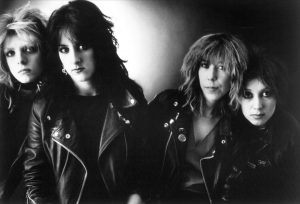 Back then, did you find yourselves constantly being chauvinistically poked at and patted on the head simply because you were young women?
Back then, did you find yourselves constantly being chauvinistically poked at and patted on the head simply because you were young women?
Enid: “Yeah, I think that’s safe to say. We certainly had some ridiculous experiences. For example, in 1980 we were playing with Uriah Heep. We were sitting, watching them sound check and security came along and started trying to drag us out of the auditorium because they thought we were groupies that slept our way in. That’s sort of the classic example of the ‘70s and ‘80s. There were so many stories of DJs abusing people; it was a very, very different world and it seemed normalised that men could come up to you and grab you and stuff. In other respects, things haven’t changed that much. To give you an example, a few years back, we wanted to play a festival in Scandinavia that, in the past, we had gone down very well at. The manager we had at the time was also managing another all-female band who were booked to play the same festival. The organisers turned around and said to him, about us, ‘Oh, no, we’ve already got our female band.’ And that’s in Scandinavia where half the government are women and it’s generally pretty good for gender equality! There’s been a lot of stuff going around recently about Reading and Leeds festivals, about how of 100 bands, only nine have women in them and only one of those bands is playing on the main stage. It’s funny, because in 1981 we headlined Friday night at the Reading festival in front of 17,000 people. I never would have imagined that 30 years later we’d still be in this position. On the other hand, there are a lot more women playing and I think part of that is that you get more rock and pop music in schools and there are opportunities out there that we certainly never had. In terms of respect, we’ve always had enormous respect from the bands that we played with, they’ve always treated us really well and as equals and we’ve always been respected by audiences. It’s just been that within the business itself, you do get some people who see women as second-class citizens.”
Kim: “In the early days we were total tomboys. That’s why we got on with the Motörhead fans because we didn’t have the big hair and loads of make-up and that’s how we still are today – well, we try and put in a bit of effort these days or we’d all look pretty awful [laughs]. But I don’t think we were treated that differently, especially by Vic; he was absolutely amazing. We didn’t actually like the idea of working with him at first. At 19 or whatever, we were all naïve and like, ‘Oh, we don’t need a producer. We can do it ourselves.’ It’s funny looking back on that. Of course now, we know a lot more so we’re quite savvy in the studio. Back then, we didn’t know anything, we just thought we did.”
When you were starting out learning to play your instruments, was it in any was a supportive climate?
Enid: “No, but it’s funny how things change from year to year. It’s February now and Kim and I did our first gig together exactly 40 years ago this month [as Painted Lady]. It’s quite shocking really and I can’t believe it. Girlschool began three years after that. Denise was up and gigging in different bands, so we were all doing this 40 years ago. Before we started Painted Lady, in 1975, Kim and I used to go down to the local youth club and there were a few guys there that played instruments and everyone just laughed at us. The reason we started an all-female band was because we couldn’t find any guys to play with us. At the time, we didn’t know anybody and didn’t have any role models; we just wanted to play music. A bit later, The Runaways appeared with ‘Cherry Bomb’ and the way they were sold initially was very sexualised. It was just everything that we were against. But a couple years after that, punk came along and the whole ethos of punk was that it was anti-Emerson, Lake and Palmer and anti-Yes. It was all about playing three chords, making loud music and that can-do attitude. Therefore, it became something women felt they could have a go at and that mindset became open to women. In the late ‘70s, there were loads and loads of female musicians about, all coming off on the back of punk. We were influenced by it, but we were outside of bands like The Raincoats and The Slits. From ‘75 to ’78, when Girlschool officially began and we hit the road, it became a completely different world in that short space of time.”
Kim: “Also, my cousin, who literally lived next door to me, was in a rock band and that’s what got me into playing guitar. He formed a band and we’d always go along to see them. But, like Enid said, no one wanted to play with the girls.”
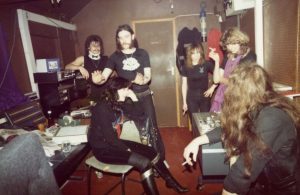 What was touring like back then?
What was touring like back then?
Enid: “When we first went on the road, we had an agent in London who had two main contacts, one guy based in France and another guy in Ireland. So, we did a lot of trips to France and Ireland [laughs]. Kim’s father was going to buy a car, but he ended up buying a van and we went out in that. My parents put up the house so we could get a loan to buy a PA and we did these tours around France, mostly. We got booked into nightclubs, so it wasn’t like doing rock tours. It was really that we’d play anywhere that would have us. We’d be going on stage at two in the morning, we couldn’t get the gear out until the club was shut down, which would be about five AM. That was tough and really gruelling, but of course we were very young. We came up bit by bit. We did our first tour with Motörhead in ‘79, but they weren’t particularly big at the time. When we were doing tours during those first couple of years, we had a transit-sized Bedford van, with all the gear in the back and six of us. When I say in the back, there wouldn’t be a dividing wall; we’d be sitting on top of the gear pretty much. If we stayed in a B&B, it was usually two rooms, so we’d have to share beds and stuff. When we came to do the bigger tours, stuff was taken care of, but we really paid our dues.”
Kim: “All that stuff of today, like email, texting, cell phones, laptops and whatever, is luxury! We were doing these tours all around Europe with us sleeping in sleeping bags on top of the gear in the back of the van that we literally stole from my parents [laughs]. We’d just go wherever we could and wherever our agent sent us. Sometimes, it’d be a two day drive to the south of France. We did a year-and-a-half all by ourselves before the first ‘Take It All Away’ single and Lemmy noticed us. We were just travelling around in this little van. I don’t know what possessed us.
“These days it’s easy. Back then, we’d have to stop off at phone boxes, if you could find one [to call home]. I remember once we broke down in, literally, the middle of nowhere near this bloody tiny village in France. We’d had it with sitting there waiting for a car to come by. I knew a smattering of French, so I walked along the road, past all kinds of dead cats and roadkill, until I found somebody who spoke enough English to get back to the van and help us. In France the venues would take us out for meals and as soon as the bread appeared on the plate, it was gone. Sometimes I can’t believe what we did. It was fun, it was an adventure and you just did what you could.”
When you think of everything that you’ve done and that you’re still doing it, how surprised are you at your longevity and the fact that Girlschool still exists?
Enid: “That’s a difficult question! I suppose I think and feel different things at different times. Kim and I grew up in the same street and it was a very working class, not a lot of money, not a lot of expectations for anyone. I used to see my brother play in a jazz band. I was very, very young at the time; I mean, I was four years old at the local social club watching the Andy Mackintosh Band and I saw him at this massive venue in Leicester Square, when I was about seven. So, even though we were a normal working class family, that part seemed normal because someone else in the family had done it. I also had a cousin who was a gymnast and I saw him on television winning some gymnastics cup. But when we said we wanted to be in a band, the more people who said we were crazy, the more that fired us up. The fact that having a brother who played music on stage and seeing a cousin on television maybe made it seem more possible. There are periods where it seemed like, ‘What are we doing?’ and other times it seemed like the most normal thing in the world.”
Kim: “We’ve kept it together mainly because we’re all mates. We are very close-knit and that’s what kept us going.”
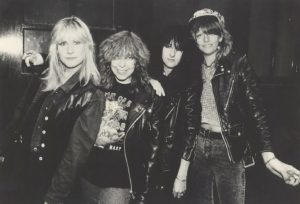 Have you ever discussed when, or if, there is an end point for Girlschool?
Have you ever discussed when, or if, there is an end point for Girlschool?
Enid: “We do have those conversations and we don’t all agree and have different ideas about it. We are all very different and with this particular situation, I’d say that when Jackie came in, and I came back after being out of the band for 18 years, in 2000, she was bursting with enthusiasm at having this opportunity and I was really fired up and raring to go and I think that kept the energy fresh, like a band starting out. At the time, Kim was like, ‘Well, we’ll do this for a little while and maybe wind things up.’ She was a little bit happier to eventually have an end date because her and Denise had been doing it all along. There are a lot of factors involved. In the first instance, none of us have kids and this is a really, really massive part of why we are as we are. Generally speaking, with female bands, someone will go off and have a kid or you get to your 30s and boyfriends and husbands don’t like their women to be on the road all the time. I don’t know why, maybe they have some kind of problem using the cooker? [laughs] Generally, men find it difficult for their women to be on the road a lot and to be left to their own devices and when kids come into the equation, I don’t know many men who are staying home with a couple of kids while the woman is out touring.
“Also, in terms of money, some bands make enough to live on, others don’t and go get sensible jobs by the time they’re 30. We’re somewhere in the middle of that. After I left the band, I did a post-grad in music, did some acting, professional astrology and some teaching. I always loved teaching, but I didn’t see that as, ‘I’ve finished performing. Now I’m going to teach for the rest of my life.’ I think also for a lot of men, as they get older and maybe want a family, that they feel they have to earn a certain amount to be comfortable and stable, which means this isn’t the business for you. I’m very feminist, so I don’t think anyone has to live by any rules they don’t want to, but I’m just acknowledging that that’s the situation for many people. We’ve only got to worry about ourselves and as long as we can get by, it’s fine. We’ve never been driven by money. We’d love to make more and be able to do things on another level. There’s also the thing about what keeps people doing it; there are some people who just love to go on stage and the adulation. I personally like the songwriting and recording, and now we’re in our 50s, it almost becomes part of the drive; it’s a creative drive.”
Kim: “In the past few years we got a new manager, Tommy and the record company behind our back and things have become a bit refreshed. We were listening to rough mixes of the album this morning and it sounds bloody good. Enid and I were saying to each other, ‘If this does take off again, what are we going to do? Keep doing this?’ I think it sounds incredible and I can’t believe we’ve done it again, but can we do this until we’re 60? Can we? I suppose ‘Why not?’ is the answer.”
Originally printed in Iron Fist #14
Copyright © 2024 Iron Fist Magazine. All Rights Reserved.